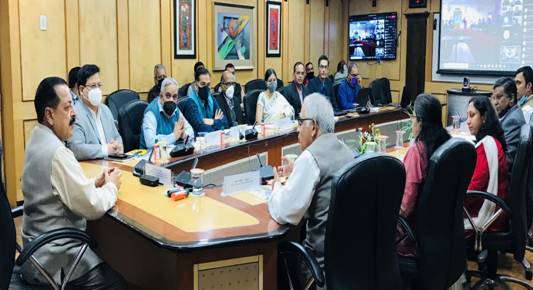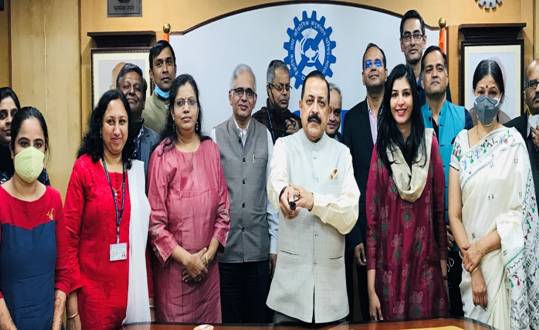Union Minister Dr.Jitendra Singh inaugurates ISRO’s 5-day Technology Conclave-2021, where Futuristic and Disruptive Technologies will be showcased

Union Minister of State (Independent Charge) Science & Technology; Minister of State (Independent Charge) Earth Sciences; MoS PMO, Personnel, Public Grievances, Pensions, Atomic Energy and Space, Dr Jitendra Singh today inaugurated ISRO’s 5-day Technology Conclave-2021 and highlighted the Futuristic and Disruptive Technologies to be developed by the Indian Space Research Organisation, ISRO. The Conclave is being organised by the Directorate of Technology Development & Innovation (DTDI) under the aegis of ISRO.
Addressing the Conclave, Dr Jitendra Singh said, the Directorate of Technology Development & Innovation (DTDI) based at ISRO Headquarters is an important link for Industry, Innovators and Academia for Research and R&D. He said, ever since Prime Minister Narendra Modi took charge, he has been giving special impetus to Space Technology and for the first time in 70 years, the sector has been unlocked for private participation to make India a competitive Space market, besides taking the benefits of the Space programme to the poorest in the country.
Dwelling on some of the Futuristic and Disruptive Technologies, Dr Jitendra Singh said, development of Satellite Based Quantum Communication will enable unconditional data security to the country’s communication network. He said, the recent demonstration of quantum communication in free space, over a distance of 300 m by ISRO, in Ahmedabad is a major milestone towards the development of Satellite Based Quantum Communication, which our country is trying to demonstrate in near future. He said that each of the futuristic technology has potential spin-off applications and these must be implemented in focused areas and government flagship programmes, which touch the life of every citizen.
The Minister congratulated ISRO for choosing Big Data Analytics as another area of investment as ISRO generates enormous amount of data from its various satellite missions and ground-based systems. He said, the investment of ISRO in terms of its intellectual and financial resources has resulted into the plethora of futuristic technologies for the space sector. He called upon the scientists to focus on thrust areas such as Artificial intelligence/Machine learning, Space Debris, Global climate study, cost effective technology access to space, indigenous manufacturing of components & parts for space systems, and green propellants. He reiterated that ISRO needs to develop mechanism to proliferate the utilizations of the futuristic technologies towards achieving Prime Minister’s vision of ‘Atmanirbhar Bharat’ mission.
Dr Jitendra Singh underlined that in the post space reforms period, the space technology landscape has changed and it must enable the participation of industries, private entities, towards the development of futuristic and disruptive technologies, besides Research and Development for innovative technologies. He urged the ISRO to bring the synergy of the efforts for inclusive development and make contributions to vibrant global economy and reap the opportunity derived from the futuristic technologies which are going to be the game changers for the space sector.
Dr Jitendra Singh pointed out that a gamut of futuristic and disruptive technologies being undertaken by ISRO include quantum radar, self-eating rocket, self-healing spacecraft and space vehicle, self-destructive satellites, photon thruster, Space-Based-Solar-Power, a bunch of Artificial Intelligence models that range from agriculture, Land use Land Cover to planetary and deep space exploration.
Union Minister Dr.Jitendra Singh launches India’s first Virtual Science Lab for children under CSIR Jigyasa programme, which will also connect students with scientists across the country
Union Minister of State (Independent Charge) Science & Technology; Minister of State (Independent Charge) Earth Sciences; MoS PMO, Personnel, Public Grievances, Pensions, Atomic Energy and Space, Dr Jitendra Singh today launched India’s first Virtual Science Lab for children under CSIR Jigyasa programme, which will also connect students with scientists across the country.
Describing the Virtual Lab as a huge new beginning, Dr Jitendra Singh said this will not only take science to all segments of students in every corner of the country, but it is also in tune with the National Education Policy (NEP), where students are allowed to choose any subject and the concept of streams has been disbanded. He said, the new facility will immensely benefit students from KendriyaVidyalayas, NavodayaVidyalayas and Government Schools, and will help in catching them young.

The Minister informed that Prime Minister Narendra Modi in a CSIR Society meeting last year appreciated the Scientist – Student Connect programme “Jigyasa” and stressed on the importance of developing Virtual Labs. Accordingly, CSIR has partnered with IIT Bombay to develop a Virtual Lab platform under CSIR Jigyasa programme, which facilitates classroom learning with laboratory research for school students. He said, the target audience for the Virtual Lab platform is students of the standard VI to XII (11-18 years) who would like to explore science using different activities, experienced researchers and faculties on the subjects of Science, Mathematics, Biology and IT.
Dr Jitendra Singh said that the main aim of the Virtual Lab is to provide quality research exposure and innovative pedagogy for school students to drive their scientific curiosity based on an online interactive medium with simulated experiments, pedagogy based content, videos, chat forums, animations, gaming, quiz, facility sharing, webinars etc. He said, the content will be available in English initially, but has been planned to be made available in Hindi and other regional languages. The CSIR Virtual lab will therefore enable curiosity driven research based concepts, encourage higher order thinking skills, promote entrepreneurship and develop passion about science, the Minister added.

Dr Jitendra Singh said, the Virtual lab would provide a virtual tour of CSIR laboratories and expose students to research infrastructure, which otherwise would be difficult to visit physically in some laboratories considering safety standards. He said, the platform will also have the option to interact with scientists and seek their inputs or clear student’s doubts. He added that the CSIR Jigyasa’s Virtual lab will be an inspirational science lab where students will read, have fun and carry out those experiments and materials which are presented by the CSIR scientists and other stakeholders.
Dr Jitendra Singh recalled that the “Jigyasa” since its launch in 2017, was successful in connecting nearly 3,00,000 students and more than 5,000 teachers with CSIR and they have benefited directly through visits to CSIR labs. He added that majority of the CSIR labs are participating in this program and subsequently MoU has been signed with JawaharNavodayaVidyalayas and also with Atal Tinkering Labs of NITI AAYOG. The Minister said, even during the Covid-19 pandemic, online interactions and webinars for school students were conducted on several topics with more than 2 lakh cumulative views.
The major stakeholders for the programme are academic based community consisting of MHRD, CSIR scientist’s faculties, Ph.D. research students, school and junior college students, Sansthas, NGOs, KendriyaVidyalayaSangathan, NavodayaVidyalayaSamithi, State Government Schools, Independent outreach faculties and institutions carrying out successful outreach activity for school and junior college students are the potential stakeholders as well as beneficiaries.
The key highlights of the virtual lab are: Open source platform; Access content in regional languages; Scientist / Researchers Support; Knowledge Upgradation for Teachers and Students; Project based support; Fun based Gaming; Need based Videos and Animation; Simulation Experiments; Promote scientific temperament; Science based webinars; Student Entrepreneurship; Student-Expert forums; Student to Student forums; Simplified content; Availability to technical assistance; Build confidence and motivation.






